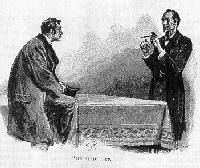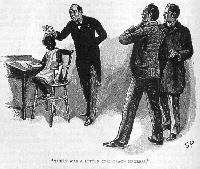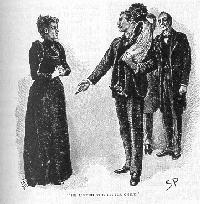Adventures of Sherlock Holmes
XIV. -THE
ADVENTURE OF THE YELLOW FACE
BY A. CONAN DOYLE.
"It is all surmise," Watson
says after Holmes explains that only blackmail could explain the duplicitous
behaviour of Grant Munro's wife in recent days. It is an amazing
statement to be made by one who has listened to countless other surmises
that have proven to be true. This comes after a less than flattering introduction
to one of the tales in which Holmes "errs" and after Watson
has praised the restraint of Sherlock cocaine habit in a statement that seems to be
devoid of sarcasm. Paget draws Watson only three times in this
tale - actually two and a half times. Whatever the source of Watson's
apparent pique throughout "The Adventure of the Yellow Face," Sidney Paget
seems to pick up on the doctor's sour bedside manner.
the restraint of Sherlock cocaine habit in a statement that seems to be
devoid of sarcasm. Paget draws Watson only three times in this
tale - actually two and a half times. Whatever the source of Watson's
apparent pique throughout "The Adventure of the Yellow Face," Sidney Paget
seems to pick up on the doctor's sour bedside manner.
In the first image Paget chooses to draw, the
pair have returned from a Watson inspired walk which has caused Holmes
to miss a client. Holmes is clearly instructing the student as he
lectures about the client's pipe "as a professor might lecture on a bone."
Paget draws a detached Professor Holmes, standing erect as if in
front of an auditorium full of students as he details the wonders of the
briar. Watson has not shed his coat, as has Holmes, and is perched
on the corner of the table farthest from Holmes and,  as
the student who sits in the last row of the lecture hall, looks as if he
will bolt if the professor turns his back.
as
the student who sits in the last row of the lecture hall, looks as if he
will bolt if the professor turns his back.
Watson is not pictured again until well after he
dismisses Holmes's assessment of the case as surmise. In this case
he is standing slightly behind Mr. Grant Munro as Homes pulls off the yellow
face of the child. Munro stands leg spread in amazement hand to throat.
While Watson steps  slightly
away and lifts an arm in surprise.
slightly
away and lifts an arm in surprise.
In Holmes's moment of triumph, a scene that
Watson says he "loves to think of, Paget has obliterated the good
doctor's visage with the body of the child and the father. The supposedly
errant Holmes is beaming at a reunion of family.
Who has erred here? Whose surmise led to a
false end? Who should be reaching for the brandy and cigars to congratulate
his friend at the end of the tale? Watson misinterprets Holmes's
modest dismissal of his "powers." The good doctor has set up Holmes
and the reader for a tale of failure, but Paget will have none of it. And
he has drawn it so.

Free counters provided by Honesty.com.
 the restraint of Sherlock cocaine habit in a statement that seems to be
devoid of sarcasm. Paget draws Watson only three times in this
tale - actually two and a half times. Whatever the source of Watson's
apparent pique throughout "The Adventure of the Yellow Face," Sidney Paget
seems to pick up on the doctor's sour bedside manner.
the restraint of Sherlock cocaine habit in a statement that seems to be
devoid of sarcasm. Paget draws Watson only three times in this
tale - actually two and a half times. Whatever the source of Watson's
apparent pique throughout "The Adventure of the Yellow Face," Sidney Paget
seems to pick up on the doctor's sour bedside manner.

